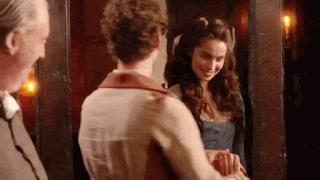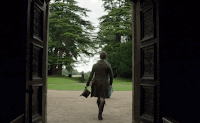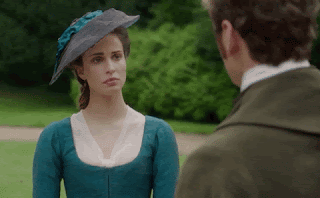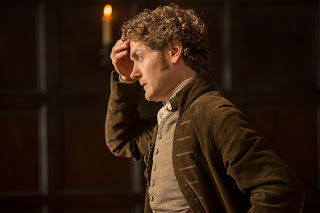Elizabeth, the loved but unloving?
The
woman who could not make up her mind is often a phase used to describe
Elizabeth Warleggan, (formerly Elizabeth Poldark and nee' Chynoweth). The
premise of the main story line for at least the first four books in the Poldark
Saga stems from her decision not to wait for her teenage sweetheart Ross
Poldark to return from the war and therefore not to honour her promise to marry
him. The initial love triangle created is through her decision to instead marry his cousin Francis Poldark. Then after
she later becomes a widow she marries Ross Poldark's worst enemy, George
Warleggan.
Whilst Winston Graham narrates that Elizabeth married George without loving him and we are not told that she ever came to do so, Graham is not at all clear in giving independent verification on whether she ever loved Francis. Although it has often been presumed that she did love Ross Poldark, curiously the narrator also never at any point confirms this either. The question of whether Elizabeth ever really loved Ross is explored in a series of blogs which starts with a first one called 'Keeping the Faith'. However if one is to say that Ross was the only man Elizabeth ever loved that would be saying that she never ever loved Francis. Could that really be true?
Whilst Winston Graham narrates that Elizabeth married George without loving him and we are not told that she ever came to do so, Graham is not at all clear in giving independent verification on whether she ever loved Francis. Although it has often been presumed that she did love Ross Poldark, curiously the narrator also never at any point confirms this either. The question of whether Elizabeth ever really loved Ross is explored in a series of blogs which starts with a first one called 'Keeping the Faith'. However if one is to say that Ross was the only man Elizabeth ever loved that would be saying that she never ever loved Francis. Could that really be true?
A
forced arrangement or a true love connection?
Indeed it is easy to get swept up in the rhetoric that Elizabeth only ever loved Ross and in doing so it is assumed that her 'mistake' was marrying Francis because she did not love him. It can then be assumed that this is the very reason her marriage to Francis was unsuccessful. The 2015-2019 BBC television adaption of Poldark may well have been primarily responsible for perpetuating the notion that Elizabeth was forced or at least heavily pressured by her parents into marrying Francis. Again this idea is explored in the blog 'Her own mind or her parent's mind?' However when considering whether Elizabeth did love Francis or was pushed to be with him, it is crucial to look at how they got together in the first place before next considering parental pressure.
"It came from outside them.."
There are numerous suggestions in the first book 'Ross Poldark' that Francis
and Elizabeth had a genuine love connection to begin with. The love
connection is implied not only by Francis but also by Elizabeth and even Verity.
When Francis attempts to explain to Ross how his engagement to Elizabeth came
about he stated that when he first met Elizabeth during the spring past while
Ross was away at war "It was like a stroke from the blue. Both
she and I--" . Not long after she was married to Francis Elizabeth
told Ross a number of times that she loves and came to love Francis and not
him (Ross). After minimising what she had with Ross to a mere "boy-girl
attachment" she states that she "....met Francis, and with
Francis it was different. I loved him. I'd grown up." As an
outsider to the love affair Verity described their connection to a distraught
Ross as "just one of those things
that happen" and just like Francis's description she too alludes to an almost
a magnetic attraction between Francis and Elizabeth when saying that "You do not argue with the
clouds or the rain or the lightning. Well this was like that. It came from
outside them."
Certainly
those explanations of the attraction between Francis and Elizabeth give the
strong impressions that their coming together was not due to a forced arrangement by their parents but quite organically and genuinely formed. Essentially Francis and Elizabeth had chemistry! They met unplanned at a party. It is not at all inconceivable that Elizabeth should have been drawn
to Francis in the magnetic type way suggested. Not in light of Graham's description of him at their engagement
dinner. Graham narrated that Francis was 'slim, neat with a fresh complexion and
clear features of handsome youth'. As for his personality he also told readers that he was 'carefree, easygoing, self-confident' and 'a young man who has never known
what it was to be in danger or short of money'. It is no wonder why Elizabeth would be attracted without there having to be pressure from her parents. Also there is a school of
thought that like many women of her time first and foremost Elizabeth saw
marriage as a means to secure a comfortable lifestyle. If so, this last credential (of Francis not appearing to be short of money) would also have been a major selling
point for her but if not that then certainly his characteristics and charming personality traits as set out by Graham were enough
of one. Either way Francis certainly presented as a good package deal. He seemed to have it all. That is the looks, personality and reasonable wealth. Aside from the appeal of these credentials all that was left to assess is Elizabeth's emotional investment in him.
The emotional connection
"We
are not the right temperament to blend..." is what Elizabeth told Ross
about how she and him were incompatible in the first edition print of 'Ross Poldark'. This was six months after she had married Francis. Of Francis she stated,
"With
Francis it was different... Our tastes were the same and we loved each
other." With what she
claimed was a more mature outlook it is easy to see how this 'carefree,
easygoing, self-confident' and handsome man with whom she shared the same tastes would take her
heart over a childish attachment to a 'boy' she felt she was not in any case well matched
with. This is especially as Ross went to war because he was irresponsible, wild and at risk of being sent to jail. For the avoidance of doubt Elizabeth also told Ross to "Try to understand.... I love Francis and married him." At her engagement diner party and as Francis gave a toast to her Graham wrote that 'Elizabeth smiled brilliantly up at her lover.' So it is quite clear that Elizabeth did have a love connection with Francis before and early into the marriage. There was an emotional investment as she identified with him and looked at him as a man that was her 'lover' and was to be her romantic partner going forward.
Although there could be a belief that Elizabeth was pressured into marrying Francis by her parents this is not a concept that is a pushed beyond all reasonable doubt by the author. It certainly is pushed in the television adaptions without approval or consultation of Winston Graham who alive at the time of the first adaption was unhappy that this first season of this series did not follow his storyline faithfully. He had passed before the 2015-2019 series was produced. In this one there was an invented scene added whereby Elizabeth who is not yet married is excitedly waiting for Ross to come and see her only to have her mother appear to burst her bubble and discourage her from having thoughts of reconciling with Ross. Next Francis arrived on the scene to cautiously check in with her whether Ross's reappearance has caused her to change her mind about marrying him. After a few anxious moment where she seemed to be reviewing her mother's advice she broke into a smile to reveal that she could not wait to be his wife. The aim of this was to imply that Francis was second best. Maybe even that she did not love him as much as she did Ross and that she had almost reluctantly under a little pressure agreed to marry him. Yet in the book there was no indication that Elizabeth changed her mind about marrying Francis whom she as Graham narrated saw as her 'lover'. Ten years later Elizabeth seemed to verify to Ross himself that she had not been unsure at the time of whether she herself wanted to marry Francis instead of him. Her words from this fourth book 'Warleggan' were "I thought I loved Francis better." In any case when Ross showed his disdain for her mother at her wedding, Elizabeth told him in no uncertain terms "What I have done I have done willingly and of my own mind. If you wish to criticize anyone you must criticize me."
Although there could be a belief that Elizabeth was pressured into marrying Francis by her parents this is not a concept that is a pushed beyond all reasonable doubt by the author. It certainly is pushed in the television adaptions without approval or consultation of Winston Graham who alive at the time of the first adaption was unhappy that this first season of this series did not follow his storyline faithfully. He had passed before the 2015-2019 series was produced. In this one there was an invented scene added whereby Elizabeth who is not yet married is excitedly waiting for Ross to come and see her only to have her mother appear to burst her bubble and discourage her from having thoughts of reconciling with Ross. Next Francis arrived on the scene to cautiously check in with her whether Ross's reappearance has caused her to change her mind about marrying him. After a few anxious moment where she seemed to be reviewing her mother's advice she broke into a smile to reveal that she could not wait to be his wife. The aim of this was to imply that Francis was second best. Maybe even that she did not love him as much as she did Ross and that she had almost reluctantly under a little pressure agreed to marry him. Yet in the book there was no indication that Elizabeth changed her mind about marrying Francis whom she as Graham narrated saw as her 'lover'. Ten years later Elizabeth seemed to verify to Ross himself that she had not been unsure at the time of whether she herself wanted to marry Francis instead of him. Her words from this fourth book 'Warleggan' were "I thought I loved Francis better." In any case when Ross showed his disdain for her mother at her wedding, Elizabeth told him in no uncertain terms "What I have done I have done willingly and of my own mind. If you wish to criticize anyone you must criticize me."
Love marriage not forced marriage
As confirmed by Elizabeth herself it is clear that not being an arranged marriage or one born out of pressure Francis and
Elizabeth's one was set up by Graham as a love marriage initially. In addition to telling Ross that she married Francis because she thought she loved him 'better', in the fifth book 'Black Moon',
Elizabeth told Morwenna (who ironically she is trying to force into a marriage)
that she had married Francis for love. She went on to say that at the time she had thought it was love. If indeed this was not really the case and she
married him under pressure from family expectations, Elizabeth would have been being untruthful to both Morwenna and Ross. However it would actually have served her interests to tell Ross that she did marry Francis because of family pressure. That way it would make her look better in Ross's eyes as that would make her rejection of him less like a betrayal and a hurt to him that was not actually her fault. If she really was pressured into marry Francis she would have used that to convince Ross that he should not blame her, she had not been responsible for his hurt and she had rejected him unwillingly and because of undue pressure. However Elizabeth did not tell Ross she was pressured into marrying Francis because even she knew that was not true. This does support the idea that at the time of marriage she really did want to marry Francis and as she said herself this was because she thought she loved him and more so than she did Ross.
The
happy marriage
When
the marriage of Francis and Elizabeth is considered one might form the impression that it was as all doom
and gloom from the start. It is presumed that it was lacking in love and this was because Elizabeth did not love Francis. Again it is this idea that supports the notion that Elizabeth
married a man she did not love and was not happy with or otherwise became unhappy with soon after. Thereby this would make her love of Ross the cause of her marriage collapsing. This is
not quite the case when looking at the timeline for when the
gloom did set in to Elizabeth and Francis's marriage.
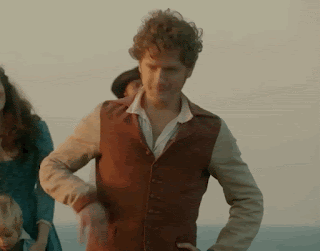 After
their marriage Elizabeth and Francis did seem to present as happily married
couple for a while. Remembering that the first book covers a four year period and with the focus on Ross as the main character, Graham only gave sneak peaks into their marriage occasionally the early good times were significant and covered a wide time period. For instance the first sneak peak was five months into their marriage When they at short notice decide to attend the Easter Monday Truro
Charity ball in April 1784 Elizabeth was reported by Graham to be in good spirits with Francis as her date. She even almost apologetically told Captain Blamey
that she hoped their 'boisterous spirits' did not jar on him. Some years later in the first edition of the second book 'Demelza', Verity reminisces on that event and recalls that '.....Elizabeth and Francis came in suddenly, quite newly married and flushed and happy, with George Warleggan.' So at that this five month stage into their marriage there was no reported marital discontent. As Geoffrey Charles was born later in October by this time she was probably just a month or so pregnant.
After
their marriage Elizabeth and Francis did seem to present as happily married
couple for a while. Remembering that the first book covers a four year period and with the focus on Ross as the main character, Graham only gave sneak peaks into their marriage occasionally the early good times were significant and covered a wide time period. For instance the first sneak peak was five months into their marriage When they at short notice decide to attend the Easter Monday Truro
Charity ball in April 1784 Elizabeth was reported by Graham to be in good spirits with Francis as her date. She even almost apologetically told Captain Blamey
that she hoped their 'boisterous spirits' did not jar on him. Some years later in the first edition of the second book 'Demelza', Verity reminisces on that event and recalls that '.....Elizabeth and Francis came in suddenly, quite newly married and flushed and happy, with George Warleggan.' So at that this five month stage into their marriage there was no reported marital discontent. As Geoffrey Charles was born later in October by this time she was probably just a month or so pregnant. Graham provided more content showing that Francis and Elizabeth maintained their marital happiness up to a year into their marriage. A month after Geoffrey Charles's birth and on the day of his christening, the first edition of 'Ross Poldark' includes a lengthier passage of Elizabeth reflecting on married life thus far. That evening after the party she thought of how '...she and Francis had lived an extravagant and care-free life.' Although her father in law was ill at the time Graham wrote of her frame of mind by saying 'But life was good to her. It seemed unsympathetic to be happy; but life was good'. This does not give the impression of a woman who a year into her marriage had realised that she did not love her husband anymore or had realised this long beforehand. It does not match with what she told Ross ten years later in 'Warleggan' that she realised her mistake in marrying Francis a few months after marriage and therefore in the very early stages of her pregnancy. It is quite likely that she exaggerated and embellished when she spoke to Ross to inspire sympathy and a belief that she had been miserable too and that this was early on when it was not quite. Thinking that her life was good of course does not suggest she was miserable as far in as a year into her marriage. Also despite seeing Ross that day at the Christening, Elizabeth did not seem to have a reaction of being upset and unsettled by coming face to face with the man she apparently realised she loved better while in her miserable marriage. In fact after Uncle Charles fell ill at the Christening Graham wrote that Elizabeth excused herself and did not even return to say goodbye to Ross. Her thoughts of him later that evening as recorded in the first edition were not off misery for seeing him but a feeling that 'Her quarrel with Ross had long since healed.' Although she had idly compared what she might have had with him Graham did not speak of any regret on her part and actually wrote that 'She had seen nothing of him and was very sorry for him...' There is little indication that she was in misery over him and longing for him.
Based on the above Graham did not confirm or suggest that Elizabeth was unsettled with a realisation that she was in love with Ross and not Francis. It is therefore safe to conclude that up until a over a year in and when Geoffrey Charles was a month old, Elizabeth was still committed to Francis as her husband and relatively happy. In fact in the first edition of 'Demelza' Elizabeth reflected that 'Somehow that day had marked the peak of her happiness....' Elizabeth actually continue her thought that it was '...from that day, from that evening, contentment had slowly receded..'
Geoffrey Charles- the powerful rival
Indeed it was an argument with Francis later that evening of Geoffrey Charles's christening which seemed to turn thing around in their marriage. In support of the idea that Elizabeth did not suddenly fall out of love with Francis because of Ross, although in their argument Francis made jealous comments about Ross Graham narrated that 'There was no one to tell him (Francis) that he was wrong in being jealous of Ross.' Graham went on to suggest that the marriage problems that Francis and Elizabeth would then go on to face was due to a different reason. He narrated that for Francis 'There was no one to tell him that another and more powerful rival had arisen. There was no one to warn him about Geoffrey Charles.' Graham went on to support this idea with indications scattered elsewhere in the books that the source of marital disharmony for Francis and Elizabeth was not Ross Poldark and a love Elizabeth had for him but Geoffrey Charles.
For Elizabeth becoming a mother was described in the book as the 'supreme experience of her life'. In her reflections on the christening day we are told that Elizabeth '...could not bear separation from her son.' The scene when Francis joined Elizabeth following these reflections for the reader provided a window into the first cracks in this marriage. Francis joined her forgetting 'his loneliness, her unapproachableness through preoccupation with Geoffrey Charles.' But then she rejected his attempts at affection 'pushing him gently away' (1st edition) and this rebuff making him feel like a 'lascivious schoolboy'.
It is clear that Elizabeth began to withdraw her love from Francis and pour this into Geoffrey Charles instead. In a conversation with Ross some three year later shortly before he married Demelza, Verity said "She (Elizabeth) is devoted to the child, and he (Francis) fond of him. Yet it seems to me that they have not got on so well since Geoffrey Charles was born." But for the avoidance of any doubt it is in the seventh book 'The Angry Tide' when Graham confirmed that 'Elizabeth...her obsessive love for Geoffrey Charles had produced the first breach between herself and Francis long ago....'
A falling out of love
No act of Love
It is easy to identify a number of behaviours after Geoffrey's Charles Christening which show a lack of love from Elizabeth towards her husband. The key one would be her pains to regain ascendancy over Ross after Demelza success when introduced to the family at their first Christmas at Trenwith. This is covered in the blog 'Elizabeth Poldark: A Touch of Red Dress Seduction'. There reference is made to her initiating this plan by wearing to Julia's Christening party a spectacularly crimson red velvet brocade dress described as flamboyant and mesmeric. Also her attempts to do the same and upstage Demelza when inviting Ross and Demelza for a simple Christmas dinner the year later whilst tricking Demelza into dressing casually in comparison. Elizabeth's declaration in 'Warleggan' to Ross that she made a mistake marrying Francis instead of him showed a complete lack of love and respect for Francis. Previously when six months into her marriage to Francis she was respectful refused to have this kind of conversation behind his back . She then told Ross "I'm married..It isn't fair to Francis to speak as you -as we are doing." So at that point she even had such respect and love for Francis that she suggested that they stay out of each other's way since they clearly could not be friends and that "For some time, this is goodbye." Now as Elizabeth much later she was embarking on a mission to gain Ross's attention. Her respect for Francis was dispensed with as clearly her love had been too.
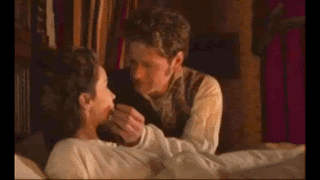
Even following Francis's suicide attempt there was a lack of love and true concern from Elizabeth. After coming to know about this she nevertheless seems quite passive in getting to the bottom of this and therefore in striving to help Francis. She tries to tease information out of Dwight and told him that she was 'put to this strait in begging information from a-stranger.' However she seemed to put this down to being unable to afford to entertain their cousins from Nampara and Francis being seldom 'in the mood for polite visiting'. One could wonder whether she thought it problematic that in the first place she should have to rely on visits from her cousins for information on why her husband attempted suicide and what efforts she made herself to secure Francis's confidence or at least to understand what was behind his moods. No such attempts are documented by Graham but in the same conversation with Dwight she seemed preoccupied with finding out whether Demelza and Ross were still happy together and asking him to invite them to Trenwith for an understated dinner where she would dress up flamboyantly for Ross. After giving all her love for Geoffrey Charles Elizabeth was distant and un-invested emotionally with Francis and his well being. She then began to concentrate her interest in another man.
The love 'did not last a whole year'
As referred above Elizabeth did tell her cousin Morwenna in 'Black Moon' that she married for what she thought was love but also stated that it 'did not last for a whole year'. This would then roughly coincide with Geoffrey Charles' birth. However whilst it seems fair to think that Elizabeth had at least thought she loved Francis to begin with and possibly for a year Graham does not confirm if these feelings were ever a true and real love. After Francis's death and in her widowhood Graham as narrator said that '...whether she loved Francis in the ordinary sense or not, he was her husband....'. Of course this does not make an unequivocal case for her loving him in a true and real way.
 It could be argued that Elizabeth did love the man Francis was to begin with and withdrew/redirected that love after the birth of her child. In his rejection and distress Francis then became a different man who went off the rails by throwing himself into gambling and infidelity. Therefore he became a man even more removed from the kind Elizabeth would love. However it
is reasonable to think that a mother's love of a first born baby should not be to the exclusion of her love for her husband and that if this caused her to then withdraw and redirect her attentions and 'love' away from him solely to that child, then it probably was not love at all. If Elizabeth, as she thought, did love
Francis to begin with then it was certainly a conditional and flaky love. It
was not powerful, durable and ardent. Without those essential qualities Elizabeth was probably quite correct in concluding that she had married for what she thought was love. From the beggining she had probably not felt the real love that could sustain and be the life blood to a longlasting marriage through all its troubles.
It could be argued that Elizabeth did love the man Francis was to begin with and withdrew/redirected that love after the birth of her child. In his rejection and distress Francis then became a different man who went off the rails by throwing himself into gambling and infidelity. Therefore he became a man even more removed from the kind Elizabeth would love. However it
is reasonable to think that a mother's love of a first born baby should not be to the exclusion of her love for her husband and that if this caused her to then withdraw and redirect her attentions and 'love' away from him solely to that child, then it probably was not love at all. If Elizabeth, as she thought, did love
Francis to begin with then it was certainly a conditional and flaky love. It
was not powerful, durable and ardent. Without those essential qualities Elizabeth was probably quite correct in concluding that she had married for what she thought was love. From the beggining she had probably not felt the real love that could sustain and be the life blood to a longlasting marriage through all its troubles.Incapable of love?
Graham does give an indication as to why Elizabeth may have struggled to love Francis and most likely any man. In 'Warleggan' when she becomes a widow. Graham stated there that "She found mother love uncomplex and wholly satisfying; in such a relationship there were no mental reservations, no attitudes to be sustained , and no conflict.' This suggest that Elizabeth was a woman who would simply find the emotional investment, struggles and commitments of an adult love too difficult and did not have the tenacity for love in good and bad times and without condition.
Perhaps
Graham's greatest clue about Elizabeth's love or her ability to love is in Dwight's speculation of her where he thought 'Elizabeth: the loved but unloving, Galatea that never woke.' In Greek mythology a Galatea was a statute made out of ivory sculpted
by Pygmalion. He fell in love with the
statute and upon kissing it she came to life. By referring to Elizabeth as one
that never woke it seems that Graham was suggesting that
Elizabeth was like the mythical fantasy woman that could never love because unlike Pygmalion's
Galatea, despite being shown love, she never reciprocated this by waking up and then showing real love to a man. Instead she would not awake and remained cold and stone like.
Art depiction of Pygmalion and his Galatea


